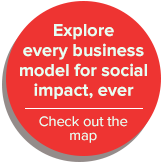 The following post is a transcript of an essay by Matthew Manos originally written in October, 2012 for Social Earth.
The following post is a transcript of an essay by Matthew Manos originally written in October, 2012 for Social Earth.
Many of you may be familiar with ABC’s Shark Tank, a show that invites entrepreneurs to pitch their business or product to a panel of investors (sharks) in the hopes of attracting investment and / or strategic partnership opportunities. Especially in anticipation of its fourth season, Shark Tank has garnered the attention of many high-level business intellectuals and social media giants that have made awareness of the show spread like wildfire into the mainstream. Better yet, the show is very family friendly which means that the little kid next door probably has a better grasp of corporate valuations and the importance of market research than you do. Much of this attention and success is due to the show’s timely concept in regards to our current election’s clear focus on small business, but is the Shark Tank teaching future entrepreneurs the wrong principals?
For many of the show’s spectators, this is their first introduction to the world of entrepreneurship. As a result, the show is very inspiring due to its promotion of individuality and freedom from the corporate 9-5 through a path of self-sufficiency (cue the star spangled banner). However, the success criteria the show has set reveals drastic favoritism for businesses that are primed for fast capital success as opposed to sustained social impact, a fact that completely neglects social innovation as a component of “successful” business.
Kevin O’Leary, one of the show’s “sharks,” defines business success in a very black and white manner: “Either you make money or you lose money.” While it is true a business requires money to survive, there are clearly many other potential measures for defining whether an entrepreneur has a “successful” idea. For this reason, the narrow measures of success that Shark Tank offers its naive and gullible (no disrespect to the general public) audience is poison to the potential for social enterprise, a movement of for-profit corporations that are designed to allow for the same kind of societal impact that a non-profit offers while maintaining the right to seek profit in order to sustain its own efforts. The genius of this model, widely popularized by Dr. Muhammad Yunus, is that it eliminates the need for government funding as well as the lack of predictability that seeking donations implies.
[slogen_shortcode_1]
This concept is well documented amongst certain groups, and honestly still unheard of amongst the majority. When it comes to primetime ABC, this is a David & Goliath kind of a situation. The Sharks are teaching America that a successful business includes all of the following:
Revenue. The company must yield an extremely high revenue, and high possibility for growth in revenue (generally by 400-500%). If you are bringing in less than a million … you aren’t doing a good job with your business.
Patents + Trademarks. The company must be proprietary so that a component (at least) can be licensed to other companies.
Scalable. The company must be able to expand in physical size in order to allow for the expansion of revenue and market share.
But here is the funny thing—none of that is required to create an impactful social businesses. When it comes to success, Social Enterprise does not have a one-size-fits-all criteria. Recently, a bold alternative to the classic Fortune 500 list has emerged. The Gamechangers 500 is a new list that was recently launched in response to the Fortune 500’s very specific focus: big revenue. A narrow focus like this actually completely neglects the importance of philanthropy, scalable impact, employee empowerment, carbon footprint, etc. The selection criteria that the Fortune 500 follows is not far from that of ABC’s Shark Tank. In fact, it measures success in the exact same way—numbers. The Gamechangers 500 list is a strong representation of the evolution of customer expectations in the 21st Century. Corporate Social Responsibility (CSR) used to be a very private thing in the sense that companies would donate each year, but not necessarily make their transactions known to the general public. In our present day, however, corporations use these acts of corporate citizenship as a way to meet the new demands of their increasingly conscious and critical consumers. This interest in corporate accountability and transparency will only get stronger in the coming years, and therefore the criteria of our favorite sharks may not yield definitively “successful” companies for much longer (in the eyes of consumers). A successful social enterprise should include the following:
Revenue. Of course! Money needs to be coming in… but only enough to sustain your efforts (initially). Social Businesses tend to have a longer “startup” life—meaning they tend to take
longer to grow financially due to the importance of growing impact first.Change is not proprietary. When everyone is fighting for a good cause, your only hope as a founder of a social enterprise is that you DO acquire more competition—it means that the progress you always dreamt to see in your lifetime.
Replicable, not Scalable. Social enterprises aim to create models that are replicable as opposed to scalable. This refers to a desire to create shared wealth amongst like-minded entrepreneurs in order to collaboratively find and create impact that is measurable and sustainable.
So, here is the thing: I suggest that we create a new show. Let’s call it “Panda Tank,” because “Sharks” are just a bit too violent for Social Enterprise, clearly. This show would introduce concepts of Impact Investing and Social Innovation to the mainstream in order to highlight the potential for success in social enterprise. Panda Tank would educate the general public on the potential for using for-profit business as a means to create a legacy that is about meaning-making and money-making as opposed to solely the latter. Here is how it would work: Entrepreneurs would enter the tank, pitch their concept, and then be challenged on the potential for sustainable and disruptive impact. Who’s in?
